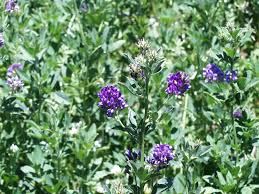SOUTH Australian scientists are conducting world-leading research which could help feed the world by using wild relatives of lucerne to breed drought-tolerant varieties.
The South Australian Research and Development Institute (SARDI) is partnering with the Crop Trust to extend its work in evaluating the potential to improve drought tolerance in lucerne.
SA Acting Minister for Primary Industries and Regional Development Dan van Holst Pellekaan said SA researchers continued to lead the way in helping farmers become more resilient.
 “South Australia is renowned for our leadership in developing crop varieties that can provide greater benefits to farmers during drought and in drier conditions and greater tolerance of pests and diseases,” he said.
“South Australia is renowned for our leadership in developing crop varieties that can provide greater benefits to farmers during drought and in drier conditions and greater tolerance of pests and diseases,” he said.
“The ultimate aim of this project is to breed new resilient varieties for developing countries that benefit subsistence and smallholder farmers.
“These farmers live in marginal food production environments and are often least equipped to deal with the variable climate.”
Minister van Holst Pellekaan said in the first three years of the project researchers had set up a network of trials to evaluate crop wild relatives of lucerne for drought tolerance in Australia, Chile, Kazakhstan and China.
“Hybrids created between these wild plants and domesticated varieties are performing well and in some cases are paving the way for increases in forage production,” he said.
“In the new project, we will continue to evaluate crop wild relatives of lucerne and work with our partners to build capacity in developing countries.
“Through this project we will also work to improve fodder conservation practices in Kazakhstan and China, as well as improving local seed production techniques.
“In this way we will begin to have an immediate impact on the lives of smaller farmers.”
Crop Trust pre-breeding expert Dr Benjamin Kilian emphasised the impact the work has on global food security.
“This work is vital for global food security by ensuring that forage varieties can adapt to changing climates and produce quality yields,” he said.
The germplasm developed during this project will be stored at the Australian Pastures Genebank at SARDI and made available for global research and production.
The Crop Trust is a non-profit international organisation based in Bonn, Germany, which works to conserve crop diversity and make it available in order to ensure food security worldwide.
This work is part of a 10-year initiative ‘Adapting Agriculture to Climate Change: Collecting, Protecting and Preparing Crop Wild Relatives’ which is supported by Government of Norway.
Source: PIRSA

HAVE YOUR SAY